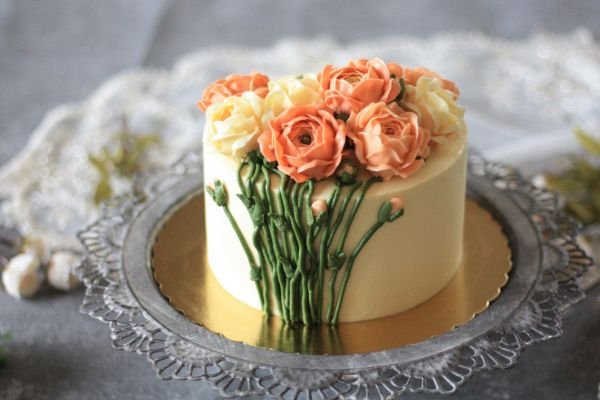Buttercream cakes are a delightful treat for any occasion, whether it’s a birthday, wedding, or simply a sweet indulgence. However, there may be times when you have leftover cake or want to prepare in advance for an upcoming event.

Understanding Buttercream Cakes
Before we delve into the freezing process, let’s first clarify what a buttercream cake is. Buttercream is a popular type of frosting made from butter, powdered sugar, and other flavorings.
It is creamy, smooth, and often used to decorate and fill cakes. Buttercream cakes are cakes covered with a layer of this frosting, providing a delicious and aesthetically pleasing finish.
Factors to Consider Before Freezing a Buttercream Cake
When contemplating freezing a buttercream cake, several factors come into play. These include the ingredients in the cake, its decoration and design, as well as the storage conditions.
Ingredients in the Cake: It’s important to consider the ingredients used in the cake itself. Some ingredients, such as fresh fruits or delicate fillings, may not freeze well and can affect the overall quality of the cake.
Decoration and Design: The decorative elements on the cake, such as intricate piping, delicate flowers, or fondant decorations, can be sensitive to freezing and thawing. This aspect needs careful attention to ensure the cake’s appearance is not compromised.
Storage Conditions: Proper storage conditions are crucial for maintaining the cake’s texture and taste. Temperature fluctuations and exposure to air can result in freezer burn or loss of moisture, leading to a less appetizing cake.
How to Freeze a Buttercream Cake
When freezing a buttercream cake, a step-by-step approach is essential to preserve its quality. Follow these guidelines to ensure the best results:
Preparation Steps: Before freezing the cake, ensure it has completely cooled down. It’s also helpful to trim any excess frosting or decorations that might get damaged during freezing or thawing.
Wrapping and Packaging: To protect the cake from freezer burn and maintain its shape, tightly wrap it in several layers of plastic wrap. For additional protection, place the wrapped cake in an airtight container or a cake box.
Freezing Process: Place the cake in the freezer on a flat and stable surface. Make sure it is positioned in such a way that it won’t be disturbed or crushed by other items. It’s advisable to freeze the cake for at least 1-2 hours before adding any additional layers of wrapping to prevent the frosting from smearing.
Thawing and Serving a Frozen Buttercream Cake
When the time comes to enjoy your frozen buttercream cake, proper thawing and serving techniques are crucial to maintain its taste and appearance.
Defrosting Methods: The recommended method for thawing a buttercream cake is to transfer it from the freezer to the refrigerator. Allow the cake to thaw gradually overnight or for several hours. This slow thawing process helps retain the cake’s moisture and prevents any drastic temperature changes that could affect its texture.
Tips for Serving: Once the cake is fully thawed, it’s ready to be served. Carefully remove the wrapping, taking care not to damage the decorations. For the best taste and texture, serve the cake at room temperature. If desired, you can add fresh garnishes or a light dusting of powdered sugar to enhance its visual appeal.
6. Best Practices for Freezing Buttercream Cakes
To ensure the best results when freezing buttercream cakes, consider the following best practices:
Storage Duration: Buttercream cakes can be safely stored in the freezer for up to 2-3 months. Beyond that timeframe, the quality may start to deteriorate. It’s always advisable to label the cake with the freezing date to keep track of its freshness.
Avoiding Common Mistakes: To maintain the cake’s integrity during freezing and thawing, avoid exposing it to temperature fluctuations or direct air. It’s also essential to handle the cake gently and avoid any rough movements that could damage the decorations.
FAQs
Freezing a buttercream cake with fondant decorations is possible, but it requires extra care. Fondant decorations may become softer and lose their shape during the thawing process, so it’s advisable to freeze the cake without any fondant accents and add them after thawing.
Cream cheese frosting can be frozen, but it may become softer and slightly grainy upon thawing. If you plan to freeze a buttercream cake with cream cheese frosting, consider adding an extra layer of buttercream over the cream cheese frosting to provide additional protection.
Yes, you can freeze individual slices of a buttercream cake. Wrap each slice tightly in plastic wrap or place them in airtight containers before freezing. This way, you can enjoy a single slice at a time without having to thaw the entire cake.
It’s not recommended to freeze a buttercream cake multiple times. Each freezing and thawing cycle can affect the cake’s texture and taste. It’s best to freeze the cake once and consume it within the recommended storage duration.
While buttercream cakes can be frozen for several months, freezing them for a year is not advisable. Over time, the cake’s quality may significantly decline, resulting in a less enjoyable eating experience.
Conclusion
Freezing a buttercream cake can be a convenient way to preserve its freshness and extend its shelf life. By following the proper techniques outlined in this article, you can successfully freeze and thaw a buttercream cake while maintaining its taste,appearance, and texture.
Remember to consider the ingredients, decorations, and storage conditions before freezing the cake. Take care in wrapping and packaging the cake securely to prevent freezer burn. Thaw the cake gradually in the refrigerator and serve it at room temperature for the best taste.
